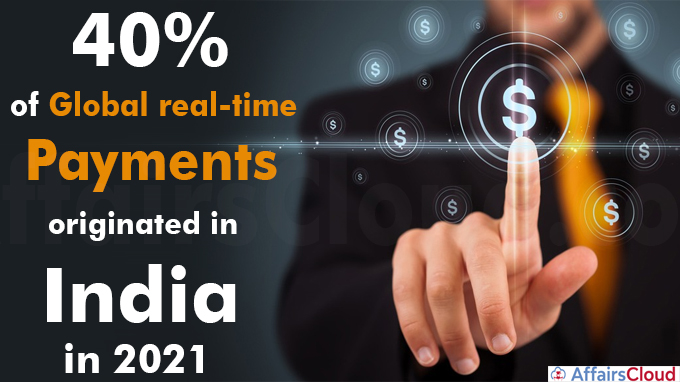
In accordance with the report titled ‘The Economic Impact of Real-Time Payments-April 2022’ by Centre for Economics and Business Research (CEBR) in partnership with GlobalData for payment solutions provider ACI Worldwide, India accounted for the highest volume of real-time payments (1st rank) among businesses around the world, with 48.6 billion real-time payments through 2021 which is 40% of Global Real-time Payments originated in 2021.
- The report featured 53 global markets, and 30 countries.
- India is followed by China at the second place with 18.5 billion real-time transactions.
- It should be noted that real-time payments refer to instantaneous digital payments that facilitate transfer of funds within a few seconds.
Global Growth trends:
In 2021, 181,261 million real-time transactions were made globally. A YoY (Year On Year) growth of 64.5% to 427,670 million transactions is projected in 2026. Following table shows 5 countries with the highest volume of real time payment transactions in 202:
Rank | Country | Real-Time Transactions (Billion) |
|---|---|---|
| 1 | India | 48.6 |
| 2 | China | 18.5 |
| 3 | Thailand | 9.7 |
| 4 | Brazil | 8.7 |
| 5 | South Korea | 7.3 |
i.In 2021, there were 92.9 billion real-time payments made across these five top real-time payments markets.
ii.There is a projection of 356.9 billion by 2026 , a CAGR (Compound annual growth rate) of 30.9% in these 5 nations.
iii.In 2021, $78.4 billion of GDP was supported by real-time payments across the 30 countries observed.
iii.In 2026, it is estimated that $173 billion of GDP will be supported by real-time payments across the 30 countries observed.
Growth Trends as per CAGR by 2026:
Table showing top 5 countries forecast to see the highest CAGR by 2026 in real-time payment transactions are:
| Rank | Country | CAGR |
|---|---|---|
| 1 | Pakistan | 160.7% |
| 2 | Croatia | 83.7% |
| 3 | Peru | 80.7% |
| 4 | Argentina | 66.3% |
| 5 | Belgium | 66.2% |
Growth by Region by CAGR by 2026:
South & Central America is predicted to see the fastest growth in real time payment transactions, with a CAGR of 51.3% by 2026; followed by Middle East, Africa & South Asia 32.6%, North America 30.2%, Europe 23%, and Asia-Pacific 15%.
Indian Scenario:
i.The key reason behind the increase Unified Payments Interface (UPI) and QR (Quick Response) code-based merchant payment is COVID-19 pandemic, an lockdown
- As of 2021, 31.3% of all payments made in India were made through real-time payment instruments.
ii.India’s real-time transactions figure is almost three times of China’s, and 6.5 times greater than the United States (US), Canada, UK (United Kingdom), France and Germany combined.
iii.It resulted in estimated cost savings of $12.6 billion for Indian businesses and consumers in 2021. This also unlocked $16.4 billion of economic output which represents 0.56% of the India’s GDP (Gross Domestic Product).
iv.It is projected that the share of real-time payments of the total payments volume will rise to 70.7% in 2026 with increase in net savings for businesses and consumers to $92.4 billion.
- This will help in generating an additional $45.9 billion by 2026 of economic output, equivalent to 1.12% of India’s formal GDP.
v.Though India became a global leader in real time payments, cash still remains a comfortable payment means for many Indians.
- Cash Payments represents 58.1% of the total payments market, but, by 2026, cash will make up only 21% of the total payments.
Other Highlights:
i.Globally, over half of consumers own and use a mobile wallet. The number rose to 52.7% in 2021, up 12.1% in the two years since 2019 (Covid-19 impact), and up 33.8% since 2018.
ii.Identity theft and confidence trickery are on the rise, accounting for 12% and 14.4% respectively of fraud cases in 2021. However, cases of card details being stolen online have falled.
- In 2021 there is slight decrease in these cases to 16.9% from 17.5% in 2020.
Click Here for Official Report
Recent Related News:
i.As per the report of Climate Change 2022, the Sixth Assessment – Working Group II reports on Impacts, Adaptation and Vulnerability by Intergovernmental Panel on Climate Change (IPCC) there will be rise in water level of The Indus, Ganga and Brahmaputra river basins by 2050 and 2100.
ii.Confederation of Indian Industry (CII) and Bain & Company jointly prepared a report titled ‘Innovation in India’s Rural Economy: disruptive business models are stimulating inclusive growth in agriculture and rural finance’ which revealed that agriculture sector grew by 11% CAGR during 2015-20 & the growth of the agriculture sector with highest disruption in terms of smartphone and internet penetration.
About ACI Worldwide:
President and CEO– Odilon Almeida
Headquarters– Coral Gables, Florida, United States
About Centre for Economics and Business Research (CEBR):
Chairman– Martin Piers
Headquarters– London, United Kingdom




